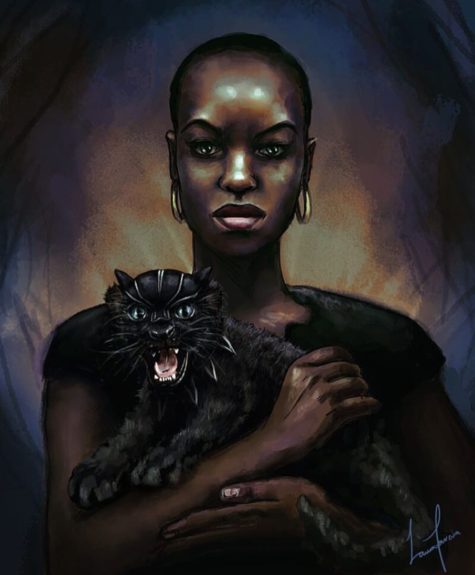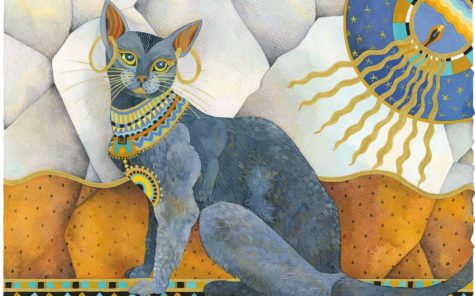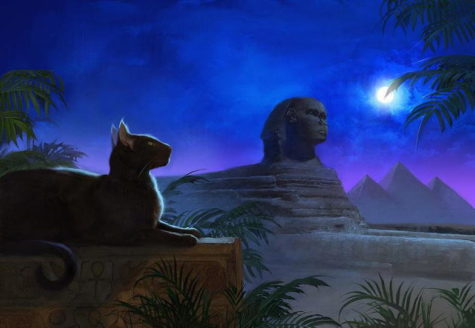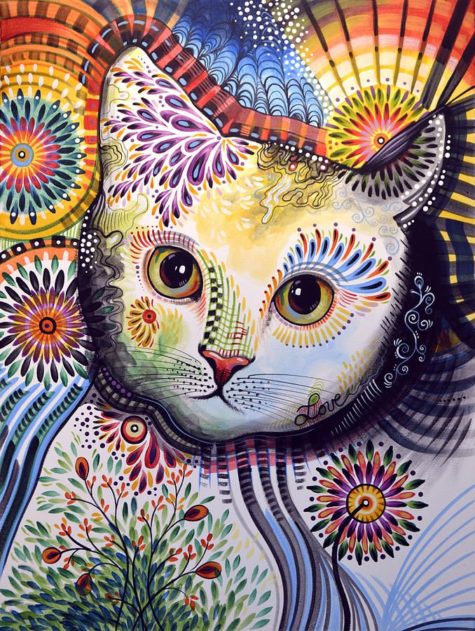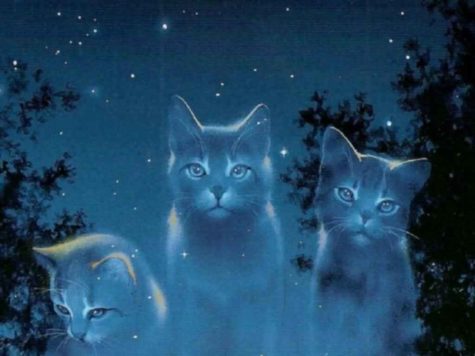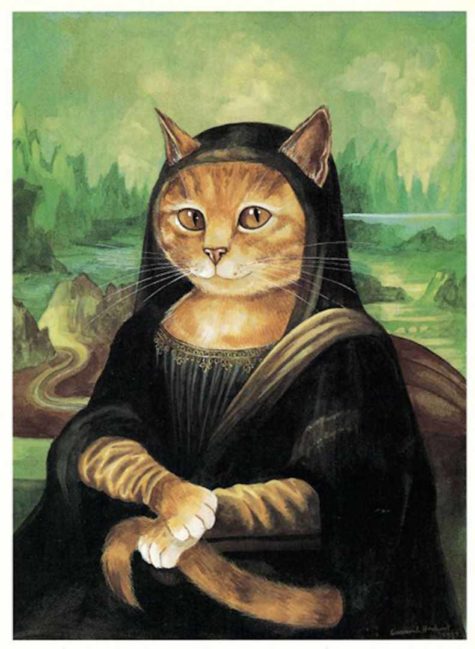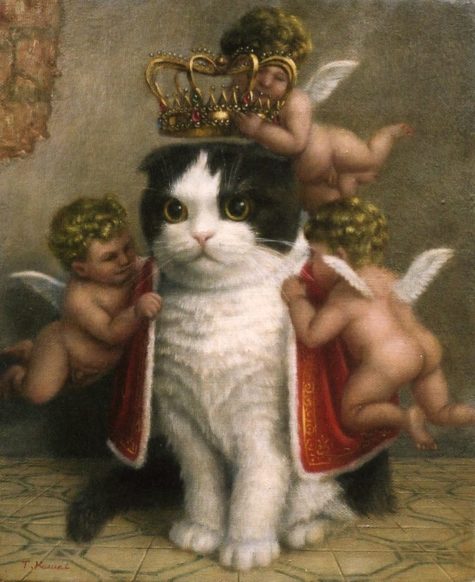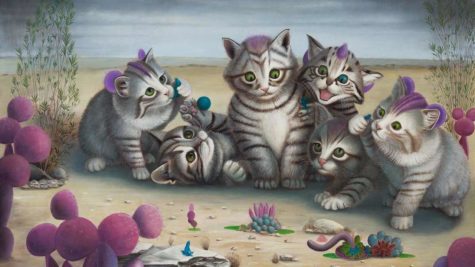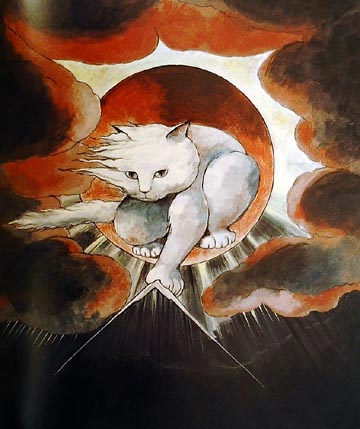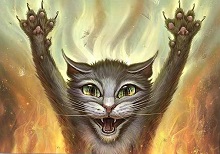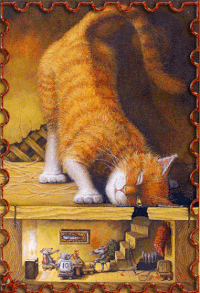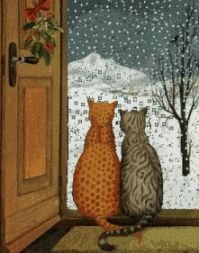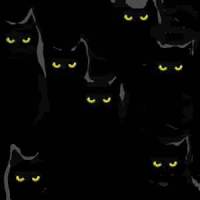Names
African Cat Gods and Lore
Africa has cats. We all know that. The problem is that most of the cats of Africa can rip you to shreds without so much as an “if-you-please.” Sure, Egypt and their adored cats were in Africa, but that culture was radically different from those of the remarkably diverse peoples inhabiting the rest of this vast continent.
Big and dangerous cats were everywhere, and I would think that dealing with them would be precarious at best. For instance, imagine how scratched up you can get when performing the marginally difficult task of giving your cat a bath. Now imagine if that cat weighed about 400 pounds like the African Lion. And lions aren’t the only big African cats; don’t forget cheetahs and leopards.
Fortunately, these magnificent creatures usually won’t harm humans unless they are starving or terrified. The indigenous people of Africa have nothing but the respect for these big-cats (and indeed all animals) and their ancient myths and legends are filled with the exploits of these creatures.
But there was one African cat that wasn’t so big. To the Africans it was just another cat, albeit, a smaller one. We’ve given it the scientific name Felis Libyca or simply the African wildcat. Around 4497 years ago (c.3000 B.C. ) this wildcat made its way through Ethiopia and up into Egypt. These are believed to be the very cats that the Egyptians domesticated.
While we’re on the subject, the cat we all know and love today is descended from the pairing of the African wildcat Felis Libyca and the European wildcat Felis Silvestris, (do you suppose this where the cartoon Sylvester got his name?) And just in case you are burning with curiosity, that adorable pussycat all snuggled nicely in your lap is designated Felis Catus.
So next time you happen to be studying the behavior of your cat, remember its rich African heritage. And if you are looking for an interesting and unusual magickal name for your cat, you might consider the following:
- AGASSOU (Ah-Gahs’-Oo) Panther Fetish of the Dahomey tribes. Male or Female:
Dahomey (now called Benin), is a country along the West Central coast of Africa, founded by the Yoruba tribe of Ife in the 12th century. Over time this region was settled by people known as the Edo and the Fon. Within this rather small district, four kingdoms arose, the mightiest of which was Abomey. Dahomey was well known for its fine craftsmanship, being particularly adept in ivory sculpture. A walled city said to be 25 miles in circumference, Dahomey was one of the magnificent jewels of African civilization. Now Agassou wasn’t a god but a fetish, which means an object empowered by spiritual forces. Since the Panther was considered a creature of great power and courage, the figure of Agassou the Panther was assigned as guardian and protector to the king (called the Oba.)
- AKONGO (Ah-Kong’-Go) Male:
There are those cats which enjoy the company of humans and then there are those that do not. If your cat is one of the kind that despises the formalities of social interaction, then listen to this tale from the Ngombe tribe of the Congo. Akongo was the Supreme god.
Being a benevolent, easy going deity he chose to live upon the earth with humanity because he enjoyed working and relaxing alongside them. But things began to grow sour. The humans began complaining and bickering about the most trivial of things. They became more and more self-centered, selfish, greedy and covetous. Where they once enjoyed idyllic pleasures during their time of leisure, they now filled those moments with drunken revelry and obnoxious behavior. Then one day, two of the humans attacked each other.
A violent battle ensued which so disgusted the god Akongo that he left humanity to themselves. He was said to have disappeared into the depths of the jungle, determined to never again associate with people. It is said that he has not been seen since. So if you know of a cat like this, antisocial and preferring solitude, remember the name Akongo.
- AMMA (Ah’-Mah) Male:
This is the Supreme god of the Dogon tribe of Mali. He was something of a misogynist actually, so here’s a name for a neutered cat that really couldn’t care less about females. Why was Amma such a misogynist? Well, being the supreme god, naturally he created the world and the universe. They say he created the stars by tossing dirt clods into the sky.
Next, he decided that he would create a woman so he could breed. He made this woman, also from clay. She was the earth. But one thing bothered Amma. Upon the surface of the newly formed earth grew a termite mound. This was in fact her clitoris. Fearing that this might prove to be a sign of a competing masculinity, the god had it severed, believing that in doing so he would make her 100% woman.
An awful story, I know, but to this day some African peoples still practice a form of female circumcision called clitoridectomy. Whether or not this has anything to do with the myth is uncertain.
- ANANSI (Ah-Nahn’-See) Male:
To the Ashanti culture he is one of the most important heroes and is the primary character in many of their myths. Even though you may not have heard of this god, there is one tale about him with which I’m sure you’re familiar.
It’s a rather long, complicated story, but the gist of it is Anansi must gather several items for the sky god Nyankopon. This he does in his prank-laden style. The last item he had to collect was a nature spirit, most elusive elementals indeed. Of course Anansi had a plan. He molded a figure of a person out of an extremely sticky resin and placed it on a rock where he knew the nature spirits often passed. Near the figure he placed a dish of food.
Before long, one of these nature elementals came by and noticed the food. The spirit asked if it could have a taste, but naturally the figure did not reply. Thinking the “person” was being disrespectful and rude, the elemental slugged the figure as hard as he could. Much to his surprise, his hand became caught in the resin. Panicking, the spirit hit the figure with his free hand and then kicked it and finally butted it with its head. With each movement the spirit became more and more stuck in the gooey tree sap until he was absolutely unable to move.
At this point Anansi approached the hopelessly trapped elemental and placed him in a sack to make his delivery. If you haven’t recognized the story by now, then you’ve never heard any of the American folk tales attributed to a fictional slave named “Uncle Remus.” This African legend is in fact the source for the story of Brer Rabbit and the tar baby. Since many cats are known for their mischievous antics and behavior that might even be construed as deliberate pranks, keep the name Anansi in mind.
- BUMBA (Boom’-Bah) Male:
Cats will at sometime in their lives throw up hair balls. No big deal, it’s just a fact of feline existence. If your cat seems to be hacking them up continuously, then this god name with its odd little tale might be appropriate.
Bumba is another one of those creator gods, this time of the Bushongo people of the Congo. How this god created the world is disgusting to say the least since he vomited up the stars, the sun, the moon, everything in fact. He then created (or vomited) Heaven and Earth who were supposed to live together as a married couple. Things didn’t work out and Heaven decided to leave for good. They have been divided ever since. Reunification is only possible when the material Earth ceases, which actually means when WE cease.
- FAMIEN (Fah’-Meen) Male:
Cats are often associated with witches and wizards and such. Some say that the reason for this is due to their unique ability to absorb evil influences and repel negative energies. Perhaps you’ve discovered this feline trait yourself through observing the protective behavior of your own cat.
If so, then Famien might be just the name for your guardian mouser. Famien was the fertility god of Guinea, but besides that he was also the preeminent luminary against demons and dark sorcerers. If that wasn’t enough, he was also the supreme lord of good health. A name that resonates with favorable luck.
- GUNAB (Goo’-Nab) Male:
For some reason this god of the Hottentot was considered an evil force, even though he is said to have created the rainbow. He was known to make dark rock quarries his domicile, so maybe if your cat likes dark hiding places this would make a suitable name.
- GURUHI (Goo-Roo’-Hee) Male:
Here’s an appropriate name for a spoiled and moody cat, prone to insisting upon selfish demands. Guruhi is another evil god, this time from Gambia. He was a most demanding and vengeful god. However, to his worshipers he bestowed great powers, providing they offered him the right kind of blood sacrifice, that is. Those uninitiated to his cult were forbidden even to gaze upon him, and Guruhi took great delight in torturing those foolish enough to ignore this rule.
- HEVIOSSO (Heh-Vee-Oh’-So) Male:
There are some cats that are content to simply relax in the window sill enjoying the sunshine. Then there are the cats that have to tear apart everything in sight, sparing neither couch nor curtain from their razor sharp claws. If this sounds familiar to you, you may consider naming your destructive kitty after the Dahomey god of thunder, Heviosso.
Besides the usual chaotic attributes which you would expect to accompany a thunder god, there is a very curious ritual performed in his honor by troupes of ceremonial dancers that explains why this name fits a ruinous kitty so well.
During his rites, the dancers of Heviosso make thunder-noises while engaging in wild movements representing the thunder god’s sexual union with the earth. These dancers froth themselves up into such turmoil that they begin wrecking everything and anything including their own homes. They tear apart bushes and vegetation. They assault innocent spectators. They’ve even been known to raze the various sacred sites to the ground. And just think, all this could be avoided if only they had a really big scratching post.
- KALUMBA (Kah-Loom’-Bah) Male:
Kalumba was the god of creation to the Luba tribe of Zaire. Cat fanciers can appreciate one story concerning this god, if only because it makes dogs look so stupid. As the tale goes, Kalumba noticed the forces of Life and Death, casually strolling down a dirt path toward the world of the creatures called men whom he had only recently created. To insure that his creations would be allowed to flourish, Kalumba posted Dog and Goat in the middle of the road with orders to let Life pass while apprehending Death.
Once Goat and Dog were in place, they started bickering about which one of them would do the best job by staying awake the longest. Goat left Dog alone, just out of spite. So, all alone, Dog did his best to keep a vigilant watch, but to no avail. Dog fell sound asleep and while deep in slumber, Death walked right on by and entered the world of man.
Well, the next day Goat returned to relieve Dog who quickly departed in shame. Determined not to be as foolish as Dog, Goat forced himself to stay wide awake. Eventually he spotted Life coming on down the road and promptly detained him. Thus it was that Life was prevented from passing to the world of men, giving Death free reign. Of course things would have been a lot different had Kalumba posted cats on that road. Especially if they were BIG cats.
- KOKOLA (Koh-Koh-Lah’) Male:
This god was supposed to keep watch over precious items and valued possessions. Legends say that he lived in a cave near the banks of Lake Victoria. It was to this cave that various articles in need of protection were brought, kind of like a rock-hewn safety deposit vault.
Now I’m sure we all know of a cat that is a bit overprotective of one thing or another. It could be a particular food-dish, a treasured catnip toy, or even a favorite place to sit. By exhibiting such behavior, the cat may very well be imitating some trace remnant of Kokola’s guardian tendencies.
- KYALA (Kye-Ah’-Lah) Male:
This is the creator god to the Nyakyusa tribe of Tanzania. He started off as a simple provincial god then made his way up to the king-sky god. He became so vainglorious as a result of his rise to power that he demanded an instant cessation in devotions from those who worshipped him. He decided that he was just too significant to be dealing with trivial little creatures like humans. Got a stuck-up feline who thinks his litter box doesn’t stink? Then here’s the consummate name.
- LEGBA (Leg’-Bah) Male:
Keep in mind, Legba is considered an evil god by the Dahomey. You may recognize his name if you are familiar with the practice of voudon or voodoo, for this African god was the original form which was later adopted by the Haitians. Evil god that he was, the Africans still paid him homage by offering preventative sacrifices more or less as a means of keeping him away. These sacrifices were often small goats, usually offered during the rites to HEVIOSSO.
Legba was also represented by small clay figurines which every tribe member kept near their home. These figures were tended to regularly by offering food and often a sacrificed chicken in an effort to satiate the dark god. I only include this name because, after all, not everyone’s cat is a saint.
- LISA (Lee’-Sah) Female:
Finally, a female name for a change. Lisa (also known as Leza or Lissa) is the chameleon god of the Dahomey. She is often associated with the chief god MAWU. Together with their son Ge (god of the moon), they form one of the many triads found in mythologies the world over. Actually, Lisa could be either a god or a goddess–something of a divine androgen. In her female state she is considered goddess of chameleons because it is told that she sent these creatures as helpmates to those humans engaged in expanding her sect.
With that in mind, I can think of two situations where one might name their cat after this chameleon goddess. First, since calico cats are a virtual potpourri of colors, the chameleon motif works nicely. Then there are those cats with fluctuating behavioral patterns that range from moody to content to wild back to moody again.
If you pay close attention, you might find that your cat is merely reflecting your own state of mind. If so, then this goddess’s common sounding name would truly fit the chameleon-like traits of your uncommon cat.
- MAWU (Mah’-Woo) Male:
We’ve already touched on Mawu and his relationship with the androgynous LISA, but it should be pointed out that he has a bit of an androgynous nature himself. To some of the Dahomey tribes Mawu remains the chief of the gods, but some tribes in West Africa consider Mawu to be the goddess of the moon. Then too, the Dahomey tribes often unify Mawu and Lisa into a male/female god named, oddly enough, Mawu-Lisa, the progenitor of all Dahomey gods.
Regardless, he is most often thought of as the creator. With Lisa and their son Ge, they form an important triad not unlike that of Egypt’s ISIS, OSIRIS, and HORUS. All this can be confusing enough as it is, so let’s leave out the part where Mawu (the moon goddess version) gives birth to a male form of Lisa (now considered a sun god) to form a unified King of the Gods. Here’s a good name for a sexually ambivalent cat, male or female. Besides, don’t you think Mawu sounds kind of like “meow”?
- MULUKU (Muh-Loo’-Koo) Male:
Another Supreme god, this time from Zambesi. The story goes that after making the earth, Muluku decided to dig two holes deep into the newly created soil. Soon a human male crawled out of one hole, while out of the other hole climbed a human female.
Right away, Muluku set to organizing these new creatures by providing them with tools and seeds with which they might begin to cultivate the land. He gave them instructions on using the tools and on the various seeds to plant. He showed them how they might build shelter and how they were to prepare the harvests which the seeds would soon yield.
Unfortunately none of this seemed to mean much to the new humans. They ate the seeds raw, tossed the tools all about making a big mess and then headed off toward the forest where they both hid in the trees. Needless to say, this irked the god to no end. As an experiment Muluku called two monkeys, a male and a female, and just for kicks gave them identical tools, seeds and instructions.
Well, the monkeys wasted no time. They planted, they worked, they built their shelters, and in time they harvested the food and even used a few of the recipes that Muluku had so thoughtfully suggested. Learning what he had set out to discover, the god knew just what his next move would be. Cutting off the tails of his two monkey friends, Muluku quickly attached them to the two foolish humans still hiding in the trees.
So it was that the original humans became monkeys and the original monkeys became humans. There is a very important message in this whimsical legend, though I have no idea what it is. Since Muluku was both a creator god and a harvest god, this name might suit a country-cat, at home in the corn and the wheat. If not, well then you’re on your own with this one.
- MUNGO (Muhn’-Goh) Male:
Here is a name that recalls the cat “Mungojerry” of T.S. Eliot fame. Actually, Mungo was the rain god of the Giryama of Kenya. To get him to send rain, what you do is sacrifice a goat along with a chicken, beat on the horn of a water buffalo while asking Mungo to send precipitation, then tie a white sheet to the roof of your house. As if through a miracle, it will begin raining! Well, eventually anyhow. Name your cat Mungo if he happens to love staring out the window on dark and drizzly days.
- NAMPA (Nahm’-Pah) Male:
Does your cat have a problem with hairballs? What cat doesn’t? Of course some cats have more of a problem than others, so if your kitty happens to be one of those chronic hairball types, Nampa may be just the name for you.
Nampa was more of a spirit than a god. To the people of Senegal he is represented as a fetish composed of pulped roots and leaves which are then, you guessed it, rolled into little balls. That’s about all the information I could get on him since only the elite get to worship him and that they do in utmost secrecy.
- NYAMBE (Nigh-Ahm’-Bee) Male:
There are actually two gods with this same name or a variation of it (Nyambi.) One is the Nyambe of the Koko tribe in Nigeria. To the Koko, he was the god of regeneration. He lived on the earth with humans and provided them with immortality through the agency of one very special, life-giving tree. But the people began to take this beneficent god for granted. This hurt Nyambe very much.
One day he called the people to gather around. When they had assembled, the god took a bundle of twigs and asked if any man was strong enough to break them. Many tried that day, but no one succeeded. Nyambe then pointed out that when the twigs were released from the bundle, they broke quite easily. He explained that when they had bound themselves to him, they had strength and nothing could take that from them, but now that they distanced themselves from him, they were alone and weak. With that, Nyambe pulled the tree of immortality from the ground and disappeared forever. It wasn’t long after this that people began to die.
The other Nyambe hails from the Barotse tribe of Upper Zambesi. His tale is interesting in that it is one of many African legends which, from tribe to tribe, speak of man’s foolishness in attempting to reach god by constructing a tower to the heavens. Sound familiar?
Anyway, this legend reads more like an old Warner Brother’s cartoon, with Nyambe being chased around the globe by a whining human named Kamonu. Kamonu was full of petty requests which the god always fulfilled. Then one day, the god had reached his limit. Unfortunately, that was the day that Kamonu’s child died.
For the first time the god’s help was needed for something really important, so Kamonu tracked Nyambe down and begged his assistance. But the god wouldn’t listen and ran away into the forest. No sooner had Nyambe settled down in the forest than he noticed Kamonu only a few steps away. The god ran off to a secluded cave, where, who should be waiting for him but Kamonu. Nyambe, stunned by the sight, ran to the top of the world’s highest mountain only to find Kamonu there already. Eventually Nyambe was able to get completely away.
Undaunted, the indefatigable Kamonu built himself a tower just as high as he possibly could. It is said that Kamonu sits upon his tower to this very day, greeting the sun and the moon as they make their passage across the sky, and that he shall continue to sit there for all eternity, hoping one day he will be allowed to see Nyambe again. In both stories you’ll notice the god’s desire to shun human society, so consider that should you be trying to think of the right name for an adopted feral cat.
- NZAMBI (Nah-Zahm’-Bee) Female:
Another female! Nzambi was the great goddess of creation to the Bakongo tribe of the Congo. She was said to have walked the world of men disguised as a filthy old beggar woman, pleading for help wherever she went. To those who assisted her she gave great rewards. However, those who offered her nothing but scorn were severely punished and learned a very hard lesson about charity. This is only one example of her style. She was known for bestowing grace or scrutiny to individuals based upon their virtues or faults, respectively. A fitting name for one of those slovenly street cats that turn out to be much more than they might have at first appeared.
- OGUN (Oh’-Guhn) Male:
The West African tribes of the Nago and Yoruba recognize Ogun as the god of iron and warfare. Since he is the god of iron, he is the patron of forgemen and metalworkers. It makes sense then that he is also the god of war when you consider the weaponry crafted by these artisans. As for Ogun himself, his weapon of choice is the machete.
This god and his machete have become symbols of clearing away difficulties, and to this end they are often evoked. This is the result of a story wherein the legendary gods first come to the earth, only to find the entire planet covered with dense thorn bushes and other barriers of wild vegetation. Rising to the occasion, Ogun used his machete to cut a pathway for his fellow deities.
Since then he has been called upon to lend his helping hand by those seeking assistance in achieving their goals. Perhaps this is also how he got his reputation as a war god. As a cat name Ogun might be good for a fighting tom, but on a more civilized note you might give this name to an emotionally beneficial cat.
- OMUMBO-ROMBONGA (Oh-Muhm’-Boh Rohm-Bong’-Gah) Male or Female:
This name doesn’t belong to a god, a devil, or even a spirit. This is the name of the tree from which all human beings were born, according to the Herero Bushmen of South West Africa. It is also the source from which many other animals originated. Because of this, it is believed that humans and animals once spoke a common language having been born from the same tree. Sadly, this language has been long forgotten by human beings. Omumbo-Rombonga is a lot easier to pronounce than it may look and makes a great name for tree-loving cats of either sex.
- RUWA (Roo’-Wah) Male:
Sometimes myths from vastly diverse cultures share common details and motifs as in the following story from the Djaga tribe of Kilimanjaro. Ruwa was the supreme god, though he had more to do with the management of creation than with actually creating it.
He had recently freed the humans from that big pot where they had been kept prisoner and now he was preparing a garden where they could live in peace. He filled this garden with all sorts of fruit bearing trees, and in the middle he placed a sacred yam which was forbidden to the humans.
Everything went just fine for a long time, but then one day an odd looking beggar came to the garden in search of food. He was offered as much of the garden’s fruits as he wished, but he claimed to have met Ruwa on the way to the garden and said that the god had told him it was time to eat the sacred yam. Without a moment’s hesitation the people pulled that yam from the middle of the garden and began to cook it with great celebration.
Soon the scent of the yam filled the air, and it wasn’t long before the smell reached heaven. Catching a slight whiff of the forbidden yam, Ruwa dashed down to the garden. There he saw the humans whooping it up, doing exactly what he had told them not to do. The god was understandably upset, especially since the word of a stranger had been followed rather than his own explicit orders.
Taking what was left of his sacred yam, Ruwa went back to heaven leaving the humans with a new susceptibility to something called death. Nothing particularly cat-like seems to be in this interesting tale, but has that ever stopped us before from finding some half-baked reason to use a name for your cat? Of course not! Use this name for an arbitrarily demanding feline with very little sense of humor.
- SHANGO (Shahn’-Goh) Male:
To the Yoruba of West Africa, Shango is the god of storms, thunder, and lightning. He carries a thunderbolt which is often symbolically rendered as an ax. In this regard he is very close to the Nordic god Thor. A good name for an extremely sharp, lightning fast cat with a volatile personality.
- WAKA (Wah’-Kah) Male:
Another rain god. But to the Galla of Ethiopia, Waka is much more than a rain god. He is also the god of rituals and ceremony. Keep this name in mind if your cat is of an ordered, mystic nature.
- WULBARI (Wool-Bahr’-Ee) Male:
Supreme god of the Krachi from West Africa. There is an odd story concerning this eccentric deity and the trickster god ANANSI. Among the animals invited to dwell in the heavenly court was Anansi, the tricky spider god. Being something of a braggart, Anansi started getting on Wulbari’s nerves. He boasted that he was much more clever than the supreme god.
To Wulbari, this just wouldn’t do. One evening the mighty god summoned the various animals to witness the presentation of a challenge to Anansi. If the trickster god could simply leave heaven for awhile and return with “something” then Wulbari would concede that the trickster god was indeed far more clever than he. There was a catch however. Wulbari wouldn’t say what the “something” was.
Accepting the challenge, Anansi left the court and promptly constructed himself a bird-suit disguise from various feathers he collected. Wulbari himself, so certain that Anansi was far away by now, blurted out that the “something” he was thinking of was the Sun, the Moon and total darkness.
Anansi, hearing this while disguised as a bird ,now knew exactly what the “something” was. Anansi came back with a sack and upon its opening, out escaped total darkness. Unable to see a thing, the other creatures fumbled about in complete chaos. Then the trickster god opened the sack again and released the Moon. That was slightly better. At least now there was a dim light in the sky. But then without warning, Anansi pulled out the brilliant Sun. This stunned everyone since their eyes had adjusted to the soft light of the Moon.
Many of the animals present were blinded by this surprise, and Wulbari was forced to admit that the trickster god had won the challenge. This tale is supposed to explain how blindness came into the world, so if you are the unfortunate owner of a blind cat (it does happen you know), then I guess this name might be appropriate. But since we all know how well cats maneuver in darkness, I think you can name any cat Wulbari in commemoration of this unusual incident.
Found at: Lowchen’s Australia
Spell for the Ancient Magickal Art of Naming
When you have chosen your kitten from the kindle (litter), being sure that this little mite is the one upon whom you wish to bestow your friendship and protection, know that this is a magickal pact, for you are guardian of the spirit of your cat, and he or she in like manner is invested with the occult power to guide and guard your spirit. You must think next of the naming ceremony, which is best done after some little acquaintance with the nature of your new friend.
Choose a pet-name for the cat’s child-spirit, and it is better if this be a folk-name, for these names have been magickally sealed with power and tradition through the ages, and the flavor of the earth is in them, and of the spirits of the earth, and of hearth and home.
Your friend may retain no more than a child-spirit for all his or her life long, but let it be given a secret, occult name also, in any event, for such a name will nurture the mysteries in the cat’s soul. It will protect the creature from malignant forces, will throw the Devil askew, and aid in the unfolding of his or her heart so that in the next life the animal may return with a spirit more gracious, bright and fair.
And if it should be that, after a year’s passing, you discover unto yourself that your cat has indeed already achieved seniority of soul, then it is meet that the animal should be given a grander name, a Name of Distinction, to inspire, foster and encourage the qualities that are beginning to reveal themselves, so that this treasure-hoard may grow and grow, and come to shine with divine brilliance like the stars of the night.
Do not hesitate to give your cat three names, for there is the inspiration of the Holy Trinity in it, and cats especially are animals of the Soul of All Things.
To name a cat three times whispers too of the uniform nature of the moon, for does not the night Goddess appear to us with either a full round face, or waxing with horns towards the east, or yet waning with horns towards the west? And in her pretty crescent or her majestic fullness, do we not see a likeness when we study the cat’s eye, for does not the contraction and dilation of its pupil speak to us of Bride and Artemis, goddesses of the new moon and the full? The cat is ever the creature of the night and goddess of the night.
- For a long list of cat names see this post on Magickal Cat Names
To name your kitty, it is well to choose one of the Egyptian days of our calendar, and to gather valerian to make into a few drops of oil, so that you may anoint him or her just on the tip of the nose and behind the ears.
An old manuscript says:
Three days there are in the year which we call Egyptian days, and this is so because they were days of great divinity and consequence to the astrologers of ancient Egypt. These three days fall on the last Monday in April, the second Monday in August, and the third Monday in December.
All of the Egyptian days are Mondays, that is, days of the moon, and so we may call upon Butis, the Goddess of Night, Diana, the Goddess of the Ascended Moon, Isis, the Goddess of the Moon at her Rising, and Sekhmet, the Lady of Flame, for she is of vital power, a seer by night, and a goddess of might whose inspiration fires the mind and elevates it to acts of heretic magick and wmoan’s wisecraft.
On such an Egyptian night, take your kitten in your arms and stand in some sequestered place, wild and lovely, where you may see the moon as she rides the skies. Have a little vial of Valerian oil ready in your pocket, and scatter a few drops around yourself upon the turf to make a magick circle.
Call upon the four angels, Kokaviel, Ghedoriah, Chokmahiel and Savaniah, for these angels are of Mercury’s messenger spirit, and he is Lord of Naming. Call down the blessing of the goddesses of the night, and imagine yourself to be standing in a pure white temple, framed by magick’s skill.
Anoint the kitten, and tell the baptismal name to the stars, afterwards proclaiming thus:
Your name I set upon your brow
And to four shining angels bow
This mark of grace your guardian be
And make your name a magick key
Goddesses of Moon and Might
Bless my spells this Egypt’s night.
The spell is now worked. After thanking the angels, spirits and goddesses who worked with you, and bowing three times to the moon and the stars, you may homewards wend your way, deservedly satisfied with the night’s enterprise and your weaving of woman’s mysteries.
From: Catspells
Magickal Cat Names
There is an old tradition of naming that belongs to wisecraft, and in the following post a list of names for cats is offered, each of which is believed to create it’s own “naming spell” if it is used in conjunction with the magickal working given here: Spell for the Ancient Magickal Art of Naming.
The list is not comprehensive, but should serve rather as a starting point for your own ideas and research concerning the delicate question of naming your cat.
Each name is supposed to impart a distinctive and individual quality:
- Names of Distinction ~ lend dignity and encourage “seniority of soul”
- Folk Names ~ foster a cat’s “child spirit”
- Magickal Names ~ bring a certain energy, effect, or magickal influence
And so, according to wiselore, a subtle three fold influence will be exerted over your feline friend when naming is celebrated as a magickal act. Alternatively, these names and their various meanings may reveal your cat’s true name, and give a bit of insight into the true nature of your feline friend.
Do not hesitate to give your cat three names, for there is the inspiration of the Holy Trinity in it, and cats especially are animals of the Soul of All Things.
To name a cat three times whispers too of the uniform nature of the moon, for does not the night Goddess appear to us with either a full round face, or waxing with horns towards the east, or yet waning with horns towards the west? And in her pretty crescent or her majestic fullness, do we not see a likeness when we study the cat’s eye, for does not the contraction and dilation of its pupil speak to us of Bride and Artemis, goddesses of the new moon and the full? The cat is ever the creature of the night and goddess of the night.
Names of Distinction
To honor the dignity of your feline companion, and to bestow consequence.
Feminine Names of Distinction
- Adeline ~ Noble Serpent
For a queen who is shy, sensitive, easily offended, quiet and unobtrusive. - Agatha~ Goodly
For a queen who is primarily reserved and proud, over whose spirit move vivid flashes of brilliance, who in rare and intimate moments is lively and kittenish - Alberta ~ Nobly Bright
For a queen who is retiring, independent, graceful, who has a pensive, dreamy air as though she lived half in the spirit world, who distrusts men. - Angelica ~ Angelic
For a queen who loves the moon and whose behavior accurately foretells the weather, who must be stirring at night, who seems to see fairies, during the day she is languid and voluptuous, her affections run deep. - Aubrelia ~ Golden
For a queen who is haughty, flighty in her affections, beautiful in appearance, adores home comforts and luxury, she is disdainful of other cats. - Awne ~ Swan Maiden
For a queen with a sparkling, humorous air, as though she were ever laughing joyously at her human friend, her affections are sentimental, she has grace and beauty, she is an ever faithful companion to one member of the family, whom she herself selects. - Beatrice ~ Blesser
For a queen who is lively, bold, intelligent and gay, she is enterprising and determined, she often finds herself in trouble, but is cheerful and imaginative in her attempts to extricate herself from it. - Berenice ~ Bringer of Victory
For a queen who is full of vanity and selfishness, yet is the soul of constancy and who unconsciously brings much laughter and amusement to her human friend. - Bridget ~ Virgin Bride, Strength
For a queen who is peaceful, homely, domesticated and devoted, she cherishes motherhood and is fiercely protective of yer young, her owner has her heart above all else, however, from whom she will accept even abuse quietly and meekly. - Clementina ~ Merciful
For a queen who is a good mother, affectionate, loyal and placid, she is sleepy, but not indolent, she will catch prey, but only for food, she is attracted to water. - Columbine ~ Dove
For a queen who is timid, resourceful, hesitant and solitary, her trust can be enticed from her, and if you are worthy, it is yours for good. - Diana ~ Goddess
This queen is a strong, proud, vital animal, her passions and affections are deeply rooted, and will never fail, she is never fickle, but always valorous and bold, she may seem to have magickal powers and to be in communion with spirits, it is easy, and instructive to converse with the soul of this cat. - Elfrida ~ Elf Threatener
Solitary, proud, dignified, this queen prefers her own company, the human friend is sometimes graciously allowed to engage her affectionate attention, she is elegant, delicate, graceful, reserved, she needs to know you will before she will place her trust in you. - Ernestina ~ Eagle Stone
For a queen who is animated, coquettish, ardent in her affections, her air is one of vulnerability, surprise and timidity, she can show great courage, however in the face of danger, and suffers pain or injury with reticence and forbearance. - Griselda ~ Stone Battle Maid
This queen is resourceful and determined, she possesses an abundant, muscular beauty, she is fearless and graceful, her soul is remote and strong, but she is deeply faithful. - Petronella ~ Rock
For a queen who is jealous in her affections arrogant, restless and alert, she is intelligent, passionate and regal, she is a conscientious though excitable mother. - Rosamund ~ Rose of the World
For a queen who is spiritual, refined and delicate in her habits, pensive, dreamy, beautiful and proud of carriage, in her affections she is gentle, yielding and ardent. - Selene ~ Moon
For a queen who is secretive, drawn to the night, dark and mysterious in her aspect, majestic, gracious, condescending, she is serene and inert during the day, her habits are luxurious and extravagant. - Sibyl ~ Wise Woman
For a queen who seems to be possessed of an ancient, steadfast soul, sagacious, calm, refined, sweet natured, she prefers quiet seclusion in the company of her owner, to whom she is passionately devoted, although she has a strong, independent, resourceful personality. - Theodora ~ Divine Gift
For a queen who is sweet of temperament, graceful, wistful, she is intuitive emotional and timid, her human friend will often dream of her, her dream-likeness is wise and full of strange prophetic powers. - Virginia ~ Maidenly
For a queen who is serious, attentive, silent and graceful, she is unassuming, but can be tempestuous when aroused, she is generally timorous and of subtle, changing moods. - Zerah ~ Rising of Light
For a queen who is whimsical, seeming to dwell in a world of visions, she is intelligent, proud and austere, her personality is daring, captivating, she can be impetuous and intrepid.
Masculine Names of Distinction
- Alfred ~ Wise Elf in Council
For a tom who is prudent, keen, cunning and wise, he is strong and bold, solitary and pensive, he does not make enemies but is held in deep respect, even dogs flee him. - Ambrose ~ Immortal
For a tom who is affectionate, trustful, languid, voluptuous and extravagant in personality, he loves the night, seeks a mate, but avoids fights, he is a first rate hunter, but will kill only for food, he is deeply crestfallen and subdued if he loses his dignity. - Aubrey ~ Elf Ruler
For a tom who seeks the company of the moon and the night, he may be away for days, yet always returns faithfully home, with a sagacious air, as though his travels have imparted much experience and wisdom, if he has a feline companion, he will become deeply attached to his friend, his owner can be sure of his affection and loyalty. - Bertrand ~ Bright Raven
For a tom who is wise and noble in his bearing, whose eyes hold great depth, who seems to hold counsel with himself as though he could gaze steadily down the highways of time and garner wisdom from ages past, he will walk with you, and guide you to strange and lovely places where the fairies dwell, he is always gentle and affectionate and devoted to his owner, although he can be fearless when the need arises. - Caradoc ~ Beloved
For a tom who is bright, humorous and agile, he displays a sweet kittenish temperament although his human friend is not fooled, for this cat is wise and gifted, he can enter your dream as a guiding beneficent spirit, he is not afraid of losing his dignity, and seems often to seek to do so, as though he had some lesson to impart to his delighted observers. - Carmichael ~ Friend of Michael
For a tom who is erratic, noble, ubiquitous, he is agile and intelligent, his temperament is like quicksilver, full of surprises and quirks, he is affectionate, though reserved. - Dominic ~ Sunday’s Child
For a tom who is lovable, changeable, though unswerving in his loyalty to his owner, he distrusts men and adores women, almost as if he would pay court to them, he chooses certain stations in his environment which become his indisputable domain, for this principle to be challenged causes him the deepest consternation, and such effrontery will cause him to leave home for a period as a chastisement to his owner. Yet being loyal, he will always return, expecting to be petted and made much of. - Egbert ~ Formidably Bright
For a tom who is sensitive, intelligent, proud of his status among his fellows, he has no sense of humor, and mishaps and misjudgments cause him agonizing humiliation and embarrassment, if his owner is party to his fall from dignity, he will sulk for hours. Being a noble tom, he is delicate and honorable in his habits and behavior. - Jabez ~ Sorrow
For a tom who is gentle, affectionate, loyal and placid, his is a solitary soul, but he will never stray far from home, as though he were cognizant of life’s shadows, he is contemplative, meek and unobtrusive, nice in his habits. - Jerome ~ Holy Name
For a tom who is impulsive, rash, haughty, he loves to dice with death, especially when he has an audience, he loves the night and the moon, but is very companionable at home, his enemies fear him, he loves human companions of the feminine gender and generally will not allow caresses from men, he is honorable in battle, and will allow vanquished foes to escape without harm, he is very jealous and possessive with his human family. - Llewellyn ~ Lionlike
For a tom who is sleek, muscular, noble and upright of carriage, he is never furtive, he loves company, but is reserved and watchful therein, strangers make him shy, rare moments find him adoringly affectionate towards his human friend, he has ever a warm heart beating beneath a cool and poised exterior. - Marmaduke ~ Sea Leader
For a tom who is a traveler, an adventurer, who seems to wish to walk the wide world, he seeks many lady loves, for whom he would fight to the death, after many wanderings, he will come home to enjoy the peace and company of the domestic fire, fully expecting to be cosseted, fussed over, petted and fondled as if he were a warrior home from the battlefield. His owners generally meet his expectations, for they sense a spirit of expansiveness and nobility in him. - Otto ~ Rich
For a tom who is fond of capers and games, he is athletic, enthusiastic, innocent, valorous and cheerful, he will seldom allow his owner to be idle, demanding constant attention and active companionship, he likes to shadow his human friend, he will, by and by, settle and grow placid and redolent for a little while, he dreams vividly, and can step into the dreams of his human companion. - Randolph ~ Wolf of the House
For a tom who is exuberantly loyal, affectionate, sweet natured and sociable, he is noble, wise, strong, intelligent and physically majestic, has moments of gravity and contemplation, but is more often absurdly kittenish, lovable and playful. - Solomon ~ Peaceful
For a tom who is languorous, luxurious, proud, extravagant and delicate in his habits, he presents an air of aristocratic refinement, as though he were cultured and high-bred, he adores his human family, who alone can induce him to relax his dignity and become playful. - Theodoric ~ Ruler
For a tom who is passionate in his freedom and independence, who is individualistic, eccentric, phlegmatic, and wise, he has periods of domesticity, when he is abundantly and overtly affectionate.
Folk Names for Feline Child Spirits
- Billy Winker
For a tom who is winsome, mischievous, easily frightened, often foolish, he stalks prey assiduously, but will turn around and run when he gets too close to his quarry. - Kitty-Witch
For the queen who is pert, capricious, frolicsome, moody, she plays the coquette to gain human attention, frisks at weather changes and thunder, becomes irritable and demanding if she cannot remain the center of attention. - Melsh Dick
For a tom who is swift and silent as a sprite, always appearing unexpectedly or spying on his human friends from hidden peepholes, he is disobedient, cheerful and heedless, he causes many minor calamities, he loves the night, and he loves to be vocal in it. - Pegsy
For a queen who is timid, frisky and shy, she dislikes company and will flee at the sight of strangers, her owner will be able to win her trust only with great effort and patience, she needs to be steadied and brought down to earth. - Pisky
For a queen who is of shifting moods, she will assume a regal air, then wax kittenishly playful, she will sulk for an hour or two, fall asleep, and wake wide-eyed and innocent, forgetful of presumed insults. - Wiggin
For a tom who is playful, foolish and unable to acquire the usual feline skills, he cannot climb, unless it be to the window ledge, where he spends most of his time, he is prone to absurd mishaps and accidents which are seldom serious, he cannot hunt, but will run after butterflies. - Wilkie
For a tom who is phlegmatic, plodding, patient, he will insist on attempting what he knows he is incapable of and has often to be rescued from treetops and other heights, he will always flee from a fight, though other toms seek to waylay him. - Yarthkins
For a queen who is playful affectionate and kittenish all her life, although she kindles many kittens, these she hides with great mystery in odd places, presenting them afterwards to her human friend with a show of triumph and pride in her achievement.
Magickal Names for Magickal Cats
Magickal names for magickal cats can encompass a wide variety of energies and ideas. If you wish to bring a certain energy, effect, or magickal influence into your life through your magickal cat, you can use the power of a name to do so.
The Earth Element
In ancient Celtic symbolism, the Earth is a unifying force. The Earth consecrates. It anchors, reunites, and re-establishes all things in need of her balancing effect.
- Earthy Names
Alluvia, Arroyo, Beck, Bare, Cairn, Chalcedon, Clay, Crag, Crystal, Dolman, Dune, Gemma, Greenwood, Grove, Jet, Ley, Mesa, Moraine, Obsidian, Onyx, Ravine, Savanna, Shale, Stone, Sylvan, Sylvana, Tarn, Telluria, Topaz, Tor, Vale.
The Air Element
Carefree, light and fast, the element of Air speaks of our distant and transparent nature, and prepares us to jump into the wind and fly. The element of Air gives us room to breathe, widens our lungs, and with them, opens our Soul to personal freedom.
- Airy Names
Aether, Anemone, Argon, Boreas, Cardea, Gale, Hurikan, Keen, Khamseen, Mesembria, Miasma, Myst, Notus, Scirocco, Skye, Tempest, Typhon, Vortex, Windflower, Zephyr.
The Fire Element
The fire element is all about transformation. The Element of Fire has great power for forging will and determination. It is our inner light as well as a living symbol of the Divine fire that burns in every soul.
- Fiery Names
Agni, Ardent, Baelfire, Blaze, Candelifera, Censer, Chandelle, Dittany, Ember, Firefly, Flame, Glint, Gorge, Magma, Phoenix, Prometheus, Pyrrha, Salamander, Scorch, Smoke, Smolder, Sylph, Tallow, Taper, Torch, Vesta, Vulcan.
The Water Element
Water is a cleansing, healing, psychic, and loving element. It is the feeling of friendship and love that pours over us when we are with our family, friends and loved ones.
- Watery Names
Amberella, Amphora, Aquamarine, Avalanche, Brine, Brook, Cascade, Chalice, Delta, Deluge, Dylan, Hailstone, Hoarforst, Llyr, Maelstorm, Moonsoon, Niagra, Nile, Oasis, Oshun, Pearl, Rain, Riverine, Scald, Serac, Storm, Telechine, Tide, Torrent, Trill, Tsunami, Wave, Weir.
Names from the Deva Kingdom
- Any flower, herb, or tree can be used for magical names:
Agrimony, Aloe, Amaranth, Anise, Betony, Buckthorn, Chervil, Damiana, Elecampane, Gentian, Germander, Lovage, Mastic, Medlar, Melilot, Oleander, Pomergranate, Savin, Samphire, Tamarind, Tarragon, and Yarrow.
- Plants that are considered especially magickal:
Aconite, Belladonna, Blackthorn, Bryony, Galangal, Hellebore, Mandrake, Nightshade, Rowan, Vervain, or Wolfbane.
Names from Myth and Legend
- Male power names:
Anu, Cernunnos or Kernunnos, Shango, Cuchulain, Gilgamesh, Hercules, Marduk, Poseidon, Samson, Taranis and Thor.
- Female power names:
Ambika, Boadicea, Cartimandua, Dellah, Durga, Galiana, Kali, Macha, Mong Ruadh, Morrigan, Myrine, Nessa, Onomaris, Oya, Scathach and Vashti.
- Female Amazon Names:
Aella, Antandre, Antianira, Antiope, Clymene, Evandre, Harpe, Hippolyta, Lyce, Melanippe, Myrian, Omphale, Otrere, Pantariste, Penthesilea, Polydora, Thalestris, Thoe, Xanthe.
- Male Centaur Names:
Ancius, Argius, Centaurus, Chiron, Crotus, Dexamenus, Elatus, Eurytion, Hippotion, Hylaeus, Nessus, Oreus, Phrixus, Thereus.
- Satyr Names:
Astraeus, Gemon, Lamis, Leneus, Lycon, Napaeus, Orestes, Pan, Petraeus, Phareus, Pithos, Poemenius, Satry, Satyrion, Satyrius, Satyros, Silenus.
- Nymphs:
Abrya, Andrastea, Anthracia, Asteria, Asterodia, Chian, Chreyse, Crannae, Dryope, Echo, Harmonia, Leuce, Marica, Menthe, Moria, Mytoessa, Neda, Nephele, Orphne, Perdix, Phiale, Philyra, Phyllis, Pitys, Rhene, Thisbe.
- Male Fairies:
Aillen, Amadan, Dubn, Brown Man, Cluricaun, Credene, Donn, Gachan, Ginvarra, Ghillie, Kelpie, Luchtar, Melwas, Oberon, Puck, Rhys Dwfen, Tamerlane, Trow, Tylwyth, Urisk, Wichtlein.
- Female Fairies:
Aeval, Aine, Airmed, Aoibheal, Banshee, Bendith, Caer, Clethard, Cliodna, Donagh, Eri, Glaistig, Uaine, Grania, Mab, Summer, Titania, Una.
From: Catspells and other sources

